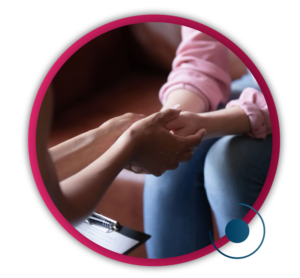The Adolescent clinic at WMN provides a multidisciplinary team consisting of a gynecologist, pediatrician, dietician and a counsellor who are well trained in adolescent issues to guide and hand hold them through this difficult phase. Efforts are made to deal with the teenagers’ concerns with utmost sensitivity, assuring privacy and confidentiality. A conversation with the youngster is initiated in a friendly, non-judgmental way in a comfortable atmosphere.
o Sexual abuse, curiosity, urges and protection training
o Sexually transmitted diseases and HPV vaccination
Adolescence (10 to19 years) is a tumultuous phase when a girl blossoms into a woman, a time of emotional, physical, psychological and social change. Hormones rage, body changes, girls are confused and find it hard to relate to their new self. It also makes them curious and excited about the opposite sex. Added to this, being bombarded by a world of misinformation makes them even more vulnerable. All these uncertainties push them toward wrong lifestyles and unnecessary complexes, which could have long term consequences on their physical and mental health.
So, it is vital that their concerns are addressed lovingly and empathetically from a sound scientific base.
Adolescents can face a broad range of gynaecological and other concerns, some of the common ones are listed below.
Excessive Menstrual Flow- menstrual flow is considered excessive when it is prolonged for more than 7 days or warrants change of pads very often (around 2 hours), causing anaemia, disrupting school, work and social activities. Menstrual cycles are initially(first 1-2 years), anovulatory resulting in irregular and excessive periods due to immaturity of the hypothalamic-pituitary-ovary axis.
Painful periods/Dysmenorrhoea- Dysmenorrhea, or menstrual cramps, is a common menstrual problem affecting 50-90% of adolescent girls. Menstrual cramps are throbbing or cramping pains in the lower abdomen, which can be severe enough to interfere with everyday activities for a couple of days every month. Painful periods start with regular ovulation, about 6–24 months after menarche and may be associated nausea, vomiting, diarrhoea, dizziness, headaches, and muscle cramps.
Menstrual issues like irregular periods, heavy flow, prolonged flow along with painful periods can be very distressing and depressing for the young adolescent and they may be unable to cope. She needs support in the form of empathetic education and awareness. Doctor at the adolescent clinic may prescribe appropriate drugs when required
Polycystic ovary syndrome (PCOS) is the most common endocrine condition affecting 6–18% of adolescent girls and may manifest with
Normal bodily changes due to puberty and problems due to poly cystic ovaries during adolescence overlap making diagnosis of PCOS challenging
Corner stones in the treatment of PCOS are
Puberty- is a phase when a child’s body begins changing into that of an adult
Precocious puberty is when the pubertal changes happen too soon, before the age of 8 years in girls and before the age of 9 years in boys.
The cause of precocious puberty often can’t be found. Treatment for precocious puberty typically includes medication to delay further development.
Delayed puberty is when girls have not started to have bodily pubertal changes by the age of 13, or they have attained physical changes of puberty, but their periods have not started by the age of 15 years.
This can occur in girls who:
o undergo intense physical training for a sport, such as running or gymnastics, swimming and dancing
o are undernourished due to long-term illnesses or have an eating disorder, such as anorexia or bulimia
The treatment of delayed puberty involves treating the cause.
Adolescence is a phase of struggle to go through the transition from a dependent child to an independent woman facing a different world. During this transition, girls become increasingly conscious of their physical and emotional self and face the following issues
Being conscious of body image- They worry about being overweight, acne, facial hair etc and may get into eating disorders.
Self-esteem issues – They either over assert their identity and get into conflicts, especially with parents and peers or have low self-esteem leading to shyness, diffidence, phobias, anxiety, depression and self-harm.
Emotional Vulnerability – Adolescents want to be liked and accepted by the peers and give in to risky behaviour. They fear rejection and hence may indulge in stealing, alcohol, sex and drugs, just to be part of the group.
The adolescents require a non-judgemental, friendly confidant who would support them appropriately in a comfortable and confidential atmosphere. The Adolescent clinic at Sbobgyn would provide a multidisciplinary team consisting of a gynecologist, pediatrician, dietician and a counsellor who are well trained in adolescent issues to guide and hand hold them through this difficult phase.
